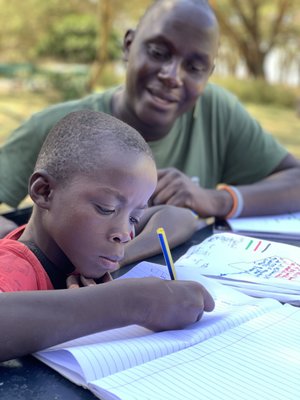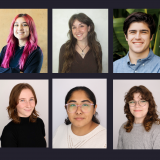Alumni Launches a Nonprofit Organization Dedicated to At-Risk Young Men Graduate Careers in Focus
April 28, 2021
The Voice of Wilkinson had the opportunity to sit down with alum Athalie Sapp (MA, International Studies ‘15), founder of For the Boys, a nonprofit organization dedicated to at-risk young men in Nairobi, Kenya. In this interview, Sapp shares how her research in the MA in International Studies program led to the founding of the organization, and offers encouraging words of advice for graduating and incoming students.
Voice of Wilkinson: Tell us about how your research and MA thesis work led to the creation of For The Boys?
Athalie Sapp: When I applied to Chapman’s MA in International Studies program, I already knew what I wanted to write my thesis about. I had just spent 4 months in Kenya for an internship and 2 months in South Africa. During that time, the street child crisis caught my attention. I spoke with a friend of mine who is from Kenya and they casually mentioned that before the 1980’s, it would have been extremely rare to see a child living on the streets. That left me asking the question: what happened during or after the 1980’s that led to this explosion of now hundreds of thousands of children living on the streets?
What was more, I knew there were dozens of organizations for street children in Nairobi alone, but that the problem was still getting worse.
So in a way, I came to Chapman on a mission to answer a question. After taking Dr. Crystal Murphy’s Non-governmental Organization course, I knew I wanted her to be my thesis advisor because of her experience with NGOs and because I knew she would push me – she was tough and she would make sure I was thorough, and I really wanted my research to matter.
I also knew that I wanted to do my own field research, so I met with my advisor and the then director of the program. They told me I could apply for a grant to fund my research, so I did. Next, I filled out the paperwork for the International Review Board (IRB) to get my research approved. Going through this process helped me get really clear about exactly what questions I was asking.
Prior to arriving in Kenya to do my research, I reached out to as many street-child-focused organizations as I could to see if they would be willing to speak with me. Ten responded, and I scheduled interviews with each of them.
I also reached out to adults that had been on the streets as children and had been successfully rehabilitated.
VoW: And what were your research questions?
Sapp: One, “what are the origins of the street child problem in Kenya?” and two, “how are the street-child-focused organizations in Kenya addressing the problem?” and three, “are their solutions fitting?”
As I conducted my interviews, there were a couple of things that every participant said: Children on the streets are disproportionately boys.
Most of them are runaways and they come from homes with absent fathers.
This led me down two paths: figuring out why are men absent from their homes, and are there any organizations focusing on this aspect of the problem?
I found myself poring over Kenyan household data, urbanization trends over the last three decades, and even comparing these trends to data from other countries in Sub-Saharan Africa. What I found was that the problem of fatherlessness was systemic – stemming from colonization and then “development”/urbanization where men were forced to leave their homes and migrate to find work.
And the absence of fathers from Kenyan households has fractured families and increased the burden on single mothers in already resource-strapped homes. Boys either head to the streets to find work to help support their families, run away because there aren’t enough resources to take care of them, or they lack supervision and end up getting caught up in street life.
And though every organization I spoke with described this as the problem, and all of the data on urbanization and Kenyan households lined up perfectly with the rising street child numbers, none of the street-child-focused organizations were addressing or naming this explicitly in their solutions or programs.
Across Kenya, there was a huge emphasis on women and girls empowerment. And though boys were doing the worst in school, dropping out the most, and were the vast majority of children on the streets, they seemed to be largely left out of the empowerment narrative with few to no organizations focusing specifically on boys.

For the Boys currently has 22 mentors and each is committed to investing in the next generation of men in their country.
VoW: Which is where your research turned to the call-to-action: For The Boys.
Sapp: In April of 2017, we officially launched For The Boys in Nairobi, Kenya and we have been up and running ever since. We’ve had over 150 boys go through our program, we are hosting our fourth camp this July, and we have recruited and trained over 30 mentors to work with our boys.
Almost all of the boys in our program come from homes where they are cared for by a single-mother or a guardian. We believe in taking a preventative approach as well. Our goal is to intercept these boys before they end up on the streets because rehabilitation work is a lot more challenging than prevention. Once a boy is enrolled in our program, he is paired with a male-mentor for two years. All of our boys and mentors meet regularly, they participate in our weekly soccer and dance programs, they go on wilderness outings, and we have an annual, week-long camp where they get out of the slums and into nature for rock-climbing, boating, hiking, and so on.
Our mentors are the backbone of our program. Seeing the positive impact these men are having on the boys is incredible. For many of the boys, this is the first positive male role model they’ve ever had.
VoW: Looking forward, what are your hopes for the future of For The Boys?
Sapp: Our plan is to grow our program to more communities in Kenya. We have a partnership model with which we come alongside an organization that is already up and running in the community, and they enroll their boys in our program. I love the aspect of collaboration with other organizations – especially organizations that are Kenyan run. Our long-term goal is to operate in other countries as well, including here in the United States.
VoW: As it’s graduation season, what words of advice do you have for graduate students graduating this summer?
Sapp: Find work that you connect deeply to – work that you believe in. And if you can’t find anyone doing the work you want to do, create what you wish existed.
And stay in touch with your professors! They can be your greatest professional resources and may even end up being friends that you cherish.
VoW: Finally, for our incoming students to the International Studies program, what did you wish you had known starting your MA? What did you appreciate about the program? Is there a takeaway that still serves you in your day-to-day endeavors?
Sapp: I wish I had known how fast it was going to go by and how much I would miss it! I still talk to my cohort and we say things to each other like, “wouldn’t it be so great to be back in the classroom discussing what’s happening in the world right now?”
Classroom discussions in the MAIS program prepared me to be a more responsible citizen who is capable of civil discourse and holding multiple truths at the same time. It also sharpened my skills in discerning what is good and reliable information. That has served me really well in the current political climate.
I also really appreciated the opportunity to do my own field research. The process of creating a research model, conducting research, and taking the findings and turning them into a blueprint for a nonprofit has been the greatest, most challenging yet rewarding experience. Starting a nonprofit has been anything but easy, but I can say we’ve built something I truly believe in.
I came out of the MAIS program confident in my ability to ask thoughtful and important questions, to interrogate my own assumptions about the world around me, and to do real research. This program enriched my life in so many ways.



